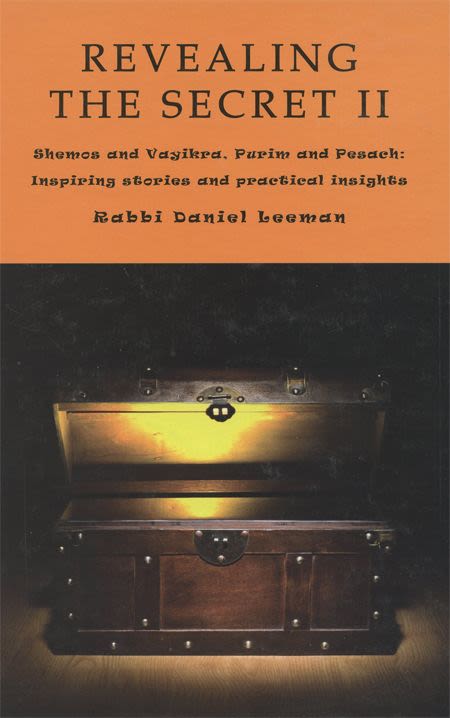
Purim
On the holiday of Purim we are commanded to read the Megillat Esther, the book in the Bible that describes how the Jewish people were saved from destruction...

On the holiday of Purim we are commanded to read the Megillat Esther, the book in the Bible that describes how the Jewish people were saved from destruction during the time of the Persian Empire.
The reading of the Megillah is a joyous occasion. People come to synagogue dressed in costume, the readers use funny voices to tell over the story and everyone has a noisemaker that is used to drown out the name of Haman – the villain of the story – whenever that name is mentioned.
Yet despite the fact that we are encouraged to have fun during the reading of the Megillah, the Sages of the Talmud did lay out a couple of rules and one of them is as follows:
A person who reads the Megillah backwards has not fulfilled his obligation (Megillah 17a).
This law doesn't just apply to a Purim prank where the reader hits the "reverse" button and turns the words of the Megillah into gibberish. It also means that if a person arrives late to synagogue and the reader is already on Chapter 7, the latecomer can't just listen to the rest of the public reading of the Megillah and then quietly read Chapters 1-6 on her own afterward. To fulfill her obligation, she has to read and hear the entire Megillah from start to finish in the correct order.
What's wrong with coming in at the middle of the story and reading it out of order? An answer can be found in a teaching from the Ramchal, Rabbi Moshe Chaim Luzzato, in his 18th century work The Way of God.
Backward vs. Forward
The Ramchal was one of Judaism's greatest thinkers, not to mention one of our most outstanding kabbalists. He made it his life's work to explain Judaism's most basic concepts, which may be basic but are also quite profound.
In his works, the Ramchal teaches that the purpose of life is to perfect the soul and thereby merit to come closer to God. Everything that happens to us is a means to help us achieve that exalted end. In theory, we all know that what the Ramchal is saying is true and so we know what is expected of us in any given situation – that we should be kind, patient, generous, etc. Yet if we know what is expected, why do we so often fail when we are put to the test?
The reason, according to the Ramchal, is quite simple: we are living our lives backward.
We rightly believe that there is such a thing as "cause and effect" – that our actions have an impact on the world and that events have an impact on the kind of person we are. However, because we usually interpret what happens in our lives through a lens that sees events out of sequence, we don't understand what in our lives is the "cause" and what is the "effect" and we are therefore unprepared to successfully meet many of life's challenges.
For instance, let's say a mother decides to wash the kitchen floor before her small son comes home from school. When the boy comes home he says he is hungry. The mother has a pot of soup simmering on the stove for that night's dinner and so she ladles out a bowl for the child. The boy insists on carrying the bowl to the table. When he is just a few steps short of reaching his goal, the child slips and all the soup spills on the floor.
What happens next will be largely determined by how the mother is "reading" the story of her life.
If she woke up that morning and reminded herself that this day was going to give her unique opportunities to perfect her soul – including perfecting the quality of patience – there is a good chance that she will be able to calmly put the incident into perspective. She will understand that it was God who arranged every detail of this test – He was the one who gave her the idea to cook the soup and wash the floor, and it was He who put into the child's head to insist on carrying the bowl to the table. And because she has done her spiritual homework, she will know how to respond correctly.
However, if she is so caught up in the many tasks of the day that she forgets her true purpose in life – and at that moment she mistakenly believes that a clean floor is the most important thing in the world – she will probably react with an angry outburst.
Even when the mother does achieve clarity and realizes that the angry outburst was inappropriate – and that she flunked the spiritual test that was given to her – she still may not fully understand what happened. For instance, if her child is often clumsy and spills things, she might harbor feelings of anger or resentment toward him because he so often tests her patience.
"Why can’t my child be like other children?" she may wonder. "Of course, I would be more patient if he wouldn't do things all the time that try my nerves."
What this mother doesn't understand is that it is not the child who is causing her patience to be tested – the child's entrance into the kitchen right after the floor has been washed is an action that comes at the middle of the story. Rather, it is God Who decided long before that her soul needs to develop this particular quality and so He has given her this child – and all the other tests of her patience that will come in life – to help her fulfill her ultimate purpose.
In other words, when we blame others for our emotional/spiritual failures, more likely than not we are looking at our lives backward. We have left God out of the picture and forgotten why we were placed on this earth in the first place.
However, this distorted way of looking at things can also happen when good things take place – such as the salvation that took place at Purim.
The Story Behind the Scenes
The Megillat Esther is unique in that the name of God is never mentioned. Throughout all the plotting by Haman – and counter-plotting by Esther and Mordechai – these two Jewish leaders seem to rely entirely on their own wits to save the day. Therefore, if a person tunes in at the middle of the story, when Esther is already ensconced in the king's palace, it is possible to come away with the impression that the salvation of the Jewish people occurred because of the intelligence and skillful diplomacy of these two leaders – and that God didn't have a part in it all.
It is only when we pay careful attention to the entire story – from beginning to end – that we realize that the myriad upon myriad of "coincidences" that lead up to the salvation couldn't have just happened because of a combination of luck and skill. There had to be someone behind the scenes who was directing every event – and that someone, of course, is God.
The Jewish people weren't saved because Esther had brains and beauty and she knew how to use them. They were saved because God still had a purpose for the Jewish people in this world, and so God chose Esther to be the means that would bring about this salvation so that they could continue to fulfill this purpose.
And the same holds true today. The headlines are full of news about what world leaders are saying about peace in the Middle East and war in Iraq. Yet to believe that it is these leaders who are running the show is to misinterpret what is really happening in world events.
Events happen – or they don't happen – because God has a purpose for the world. That purpose is to bring the world and everyone in it to ultimate perfection. Sometimes it might seem like the exact opposite is happening – that the world is spinning further and further away from goodness – and yet our Jewish tradition tells us that this can't possibly be so.
Therefore, to stay calm during these uncertain times, we can do no better than to follow the dictum of our Sages. As Jews, we are forbidden to read the Megillah backward – whether it be the Megillat Esther that we read on Purim or the "whole megillah" that makes up the events of our lives.
***
Libi Astaire is the author of Choose Light! Chassidic Tales for Chanukah, Rosh Hashanah, Sukkos, Passover & Shavuos; Breakfast with Rav Zusha and Other Stories to Wake Up Your Soul; and the award-winning Jewish Regency Mystery Series. Visit her website for more information about these and other books.











Tell us what you think!
Thank you for your comment!
It will be published after approval by the Editor.